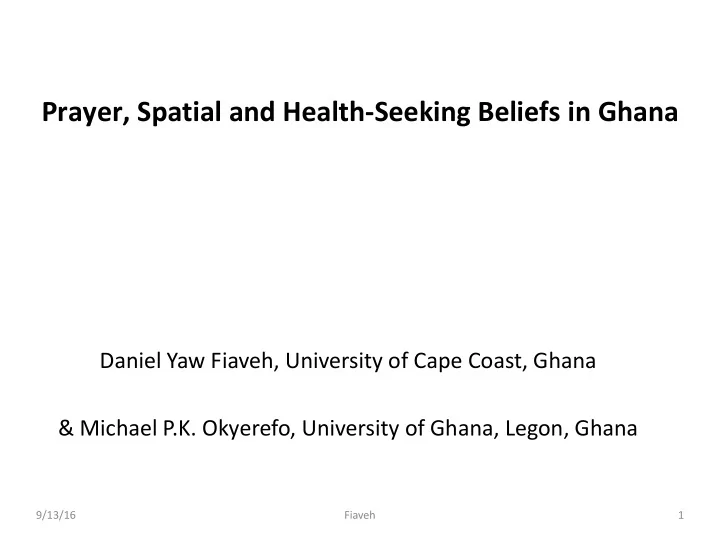

Prayer, Spatial and Health-Seeking Beliefs in Ghana Daniel Yaw Fiaveh, University of Cape Coast, Ghana & Michael P.K. Okyerefo, University of Ghana, Legon, Ghana 9/13/16 Fiaveh 1
Introduction • To discuss the religious and health seeking beliefs of informal prayer groups in Ghana. • We interrogate the link between prayer and health- seeking attitude, with particular reference to how the forest as ‘religious space’ plays a prominent role. 9/13/16 2
Intro Cont’d • Religion largely explains healthcare beliefs and behaviour (de Graft Aikins, 2005; Okyerefo, 2011; Twumasi, 2005). • Drawing examples from Witchcraft accusations, HIV, Ebola, etc. (Levine, 2011; Roura et al. 2010; WHO, 2014). • Reasoned action and planned behaviour (e.g., Ajzen, 1991; Fishbein & Ajzen, 1975) induced by group norms; God is “the greatest physician” 9/13/16 3
Intro Cont’d • Growth of Pentecostal-Charismatic [P-CC] Christian churches and healing. • In Ghana, P-CC form 28.3% population, Protestants 18.4%; Catholic 13.1% of the population with 71.2% Christians, (GSS 2012). • Belief in seclusion as a ‘religious space’ e.gs., parks, forests, etc. 9/13/16 4
How does the conceptualization of the forest influence perceptions of prayer and healing beliefs in Ghana? 9/13/16 5
Methods • Qualitative and exploratory • Achimota Forest; 248,698 visits to PGs in 2009, average of 20,000 per month (GFC, 2010) • Purposive and Snowball; 32 interviewees & 2 Group interviews • Thematic Analysis (Bryman, 2008) • Demographics: female (27). Most members (30) were below 40 years. Twenty-six (26) were married 15 were single. The education straddles JHS to SHS with varied occupations Fiaveh 6 9/13/16
Table 1 Summary of Demographic Characteristics Number of Interviewees Total Individual Interviews Women Men Ordinary Members 18 6 24 Leaders 1 7 8 Group Interviews GI 1 ( n 8) 8 - 8 GI 2 ( n 4) - 4 4 9/13/16 7
RESULTS 9/13/16 8
Conceptualizing ill health • Interviewees distinguished between physical (i.e., lifestyle and emotional cause) to spiritual cause (“spiritual attack”). • Lifestyle related diseases include malaria, cholera, general body pains, diabetes, stroke; and were gendered. • Women saw heart disease as a health problem for women through emotional stress (as a result of a husband’s infidelity) . 9/13/16 9
Quote 1; (Member, male, 60 years, married) You know there are some diseases that you get and the doctors can’t even explain to you. Sometimes a spiritual attack or a curse from your enemy or something your parents did. You see even HIV can be a spiritual attack. Some people are not spoilt [promiscuous] but is surprising to hear that this person has gotten [contracted] this disease [HIV]. Have you heard of what some call “Tukpe”? Or Ashanti’s as “duabɔ”. 9/13/16 10
Forest as a sacred ‘space’ • Forest was seen as an opportunity to express themselves freely and as space for more prayer and counseling time with their leader unlike the walled confines of a church citing the Bible. • They believe the leader or pastor has less time with his or her congregants in walled churches. • They made a salient difference between praying at home and the forest, comforts and noise they make. 9/13/16 11
Quote 2; Grp Int. 2, average age of 32 years Church auditoriums are situated in towns and there is the tendency of disturbing people. But here we don’t disturb and we can communicate freely with our Father. Moreover, this man [Prayer Group Leader] is special and God has opened his eyes to see visions, which is why we like this place. 9/13/16 12
Prayer and healing beliefs • The interviewees’ health-seeking behavior point to miscommunications about some causes of diseases. • The members linked their religious beliefs to faith in herbal remedies compared to mainstream hospitals and Western biomedical care. • They accept herbal medicine or even recommend its use as long as it is not used in connection with asserting belief in traditional religion. • On another level, prayer is complementary to hospitals and Western biomedical care. 9/13/16 13
Quote 3; Member, female, 26 years, unmarried Doctors treat but God heals. After prayer and healing, you still need to go to the hospital for check-ups. The hospital and the pastor support you as you take your medication. 9/13/16 14
Conclusion • The initial findings show that there are several reasons why prayer group members in this study resort to the forest, such as finding a serene sacred space in a crowded city to confront the vicissitudes of life. • Disease, for the prayer group members, has spiritual and physical origins, making them seek both biomedical and spiritual care. • Interviewees were convinced that hospitals can help with physical diseases, but spiritual diseases require spiritual solutions, such as prayer. 9/13/16 15
Conclusion cont’d • The interviewees shared in the general belief that doctors can treat certain conditions, but only God heals. • We suggest the development of health outreach/education programmes to alter beliefs and cultural practices of a huge constituency in the field of health care in Ghana. 9/13/16 16
THANK YOU 9/13/16 17
Recommend
More recommend